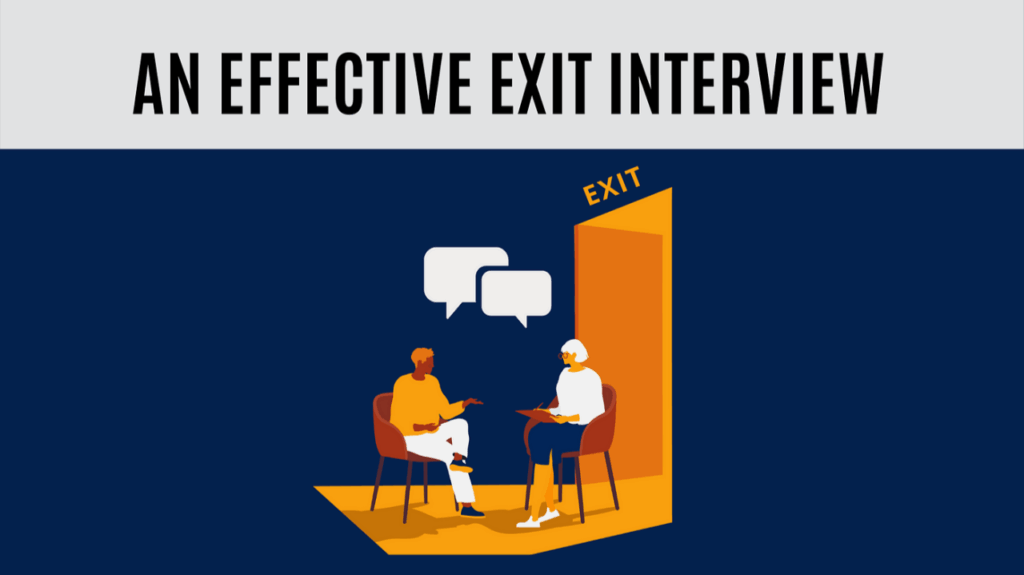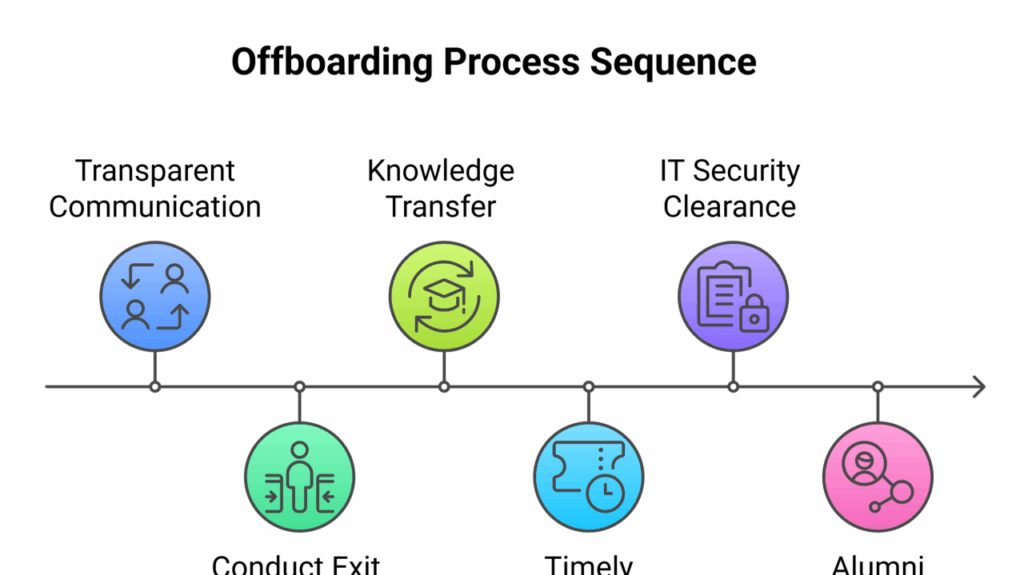An exit interview is not just a box-ticking exercise; it is an opportunity for businesses to examine their work culture, leadership, and employee experience. If managed effectively, the final interview can identify important areas of improvement, enhance employer branding, and reduce future turnover.
However, merely conducting an exit interview will not accomplish anything: it is how the exit interview is managed that will determine its effectiveness. A planned, informal, and action-oriented process will provide an opportunity for both the company and the returning employee to engage in growth, rather than just a conclusion.
Table of Contents
What is an Exit Interview?
An exit interview is the final conversation that a company conducts with a departing employee. The goal of the exit interview is to explore the departing employee’s experience, request feedback, and explore ways in which improvement can be made to keep talented employees.
Exit interviews are a vital aspect of the offboarding process, as the way the interview is conducted may have an impact on the overall employer’s brand and hiring success in the future.
Moreover, these interviews are typically led by an HR professional or line manager and provide another opportunity for the organization to be able to turn a departing employee into a brand ambassador or advocate.
What Happens in an Exit Interview?
Exit interviews typically consist of a formal discussion in which the employer asks the employee some common questions, including the reasons they are leaving, their impressions of the organization and its culture, their impressions of management, and any suggestions they might have for improvement. Hopefully, the exit interview follows a standard questionnaire for consistency. Even a small sample of exit interview data can be reviewed in aggregate and undergo further analysis to identify trends and concrete enhancements.
Benefits of Exit Interviews
Although not a legal requirement, exit interviews offer valuable strategic benefits for both the departing employee and the organization.
For the Employees
Exit interviews allow the departing employees the opportunity to reflect, express their thoughts and opinions, and leave the organization on a positive note. It helps with closure, and perhaps provides some validation of their tenure with the organization. By sharing their thoughts and opinions, they can move forward with confidence knowing they were able to state their case.
Along with closure, taking part in an exit interview helps employees develop important communication skills, like how to provide constructive feedback in a professional environment. It also helps the employee gain insight into their own career trajectory: what worked for them, what didn’t, and what is important to them in their next career opportunity.
Exit interviews are a lot about learning. They empower employees to reflect on their career goals, refine their expectations for future workplaces, and ensure they step into their next opportunity with greater clarity and confidence.
For HR
These interviews help the HR team gain a better understanding of the organization’s work culture, strengthen the company’s employer brand, and highlight where there are opportunities to improve retention rates. In many cases, organizations may want to simply let an employee leave quietly when tensions are high, but it is worth it to fight the impulse to do that and think through the exit interview process to help identify a pattern and prevent additional departures at the same time.

Receiving exit interview feedback allows HR to pinpoint gaps in culture or operations for employees and understand the reasons why employees are leaving the organization and then develop proactive, targeted retention strategies that address employee concerns. This information can also be used to enhance the onboarding process that engages the new employee from the moment they are hired to feel valued, supported, and motivated to get to work.
For Businesses
Here are some benefits of exit interviews for businesses:
Identifying Timely Issues
Employees who are leaving the company tend to be more candid and authentic because there’s little fear of a negative consequence. Exit interviews create a uniquely valuable opportunity to receive insight into the leadership culture, work environment, training and development opportunities, and employee morale, as they typically lack any filter.
Noting employee feedback will help organizations to identify recurring issues and make recommendations for meaningful institutional changes to improve employee satisfaction and retention.

Branding as an Employer
Exit interviews are the last opportunity to generate goodwill among departing employees. When departing employees and employers engage through open two-way dialogue where the employers exhibit active listening, empathy, and acknowledgement for feedback, it communicates an appreciation for future improvement.
When departing employees feel valued and heard, they will more likely share positive thoughts about their experience and recommend the employer to another.
Lowering Turnover and Increasing Productivity
Employees will notice when employers address points that were expressed during exit interviews and will make changes accordingly to reduce turnover and enhance morale. Showing employees that their concerns and suggestions lead to meaningful change creates a sense of trust and engagement amongst employees, which inspires productivity and job satisfaction throughout the organization.
What to Do
Prior to the exit interview, review the employee’s performance file, past feedback given, and relevant company policies. Develop a checklist and list of open-ended questions to help with colloquialisms.
Select a setting for the exit interview with consideration of privacy and confidentiality. This may help to encourage the employee to share insightful feedback. Additionally, reassure the employee that their feedback will be kept confidential, and will not affect employment references.

Ensure that you are engaging in active listening and have an empathetic communication style. People leave jobs for multiple reasons, and it is essential to acknowledge their contribution and allow them to verbalize their stories. Some of the feedback can include relatively general questions, and other documents will be more direct to reveal ongoing experiences and employee organization and culture impressions when he/she was employed.
Remember to record the exit interview accurately and free from bias. Accurate documentation allows HR to identify trends and identify repeat issues in your firm. Interactivity with the departing employee, balanced with no defensively projected responses, encourages a communication path between your employee and offspring documentation.
At the exit interview conclusion, thank the employee for their time and commitment to the organization. Thank the employee for their established, outlined process of the exit interview and report. The exit interview should be reviewed, and conclusions drawn regularly to establish ideas, conclusions, and improvements with respect to employee job retention and working culture.
What Not to Do
Preparing inadequately, such as not reviewing the employee file, job description, or performance evaluation, can result in missing key discussion points and valuable insights. Getting defensive when receiving criticism can create a hostile environment, making the employee less likely to be open and honest. Moreover, focusing solely on the negatives can overshadow positive experiences and valuable insights. A balanced discussion that acknowledges both challenges and accomplishments helps create a constructive conversation.
Avoid asking leading questions that assume certain answers or direct the conversation in a particular direction. This can skew responses and limit genuine feedback. Lastly, exit interviews should not be treated as the final step. Failing to act on the feedback collected renders the entire process ineffective. If employees feel their concerns are ignored, it can damage trust and reduce the credibility of future exit interviews.
Beyond Goodbye
Exit interviews serve as a bridge between past experiences and future improvements. They offer organizations the chance to listen, learn, and evolve while giving employees the space to voice their insights. When done right, these conversations not only help businesses refine their culture and retention strategies but also leave a lasting positive impression on departing employees. The key is to approach them with preparation, openness, and a commitment to action. By valuing feedback and making meaningful changes, companies can promote a more engaged, satisfied, and loyal workforce.
Visit EvolveDash today for fresh insights and practical tips on how to address workplace issues to grow in your career!
FAQs
- Are exit interviews mandatory?
No, exit interviews are not legally required, but they are highly recommended for gaining valuable employee feedback.
- Should exit interviews be confidential?
Yes, ensuring confidentiality encourages honesty and helps employees feel comfortable sharing their thoughts.
- Who should conduct the exit interview?
Typically, an HR representative or a neutral third party should conduct the interview to ensure objectivity.
- What types of questions should be asked in an exit interview?
Open-ended questions about workplace culture, leadership, growth opportunities, and reasons for leaving provide the most useful insights.
- What should a company do with exit interview feedback?
Organizations should analyze feedback, identify patterns, and take actionable steps to improve employee retention and workplace culture.



















